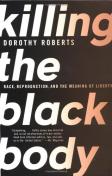BKMT READING GUIDES
Killing the Black Body: Race, Reproduction, and the Meaning of Liberty
by Dorothy Roberts
Paperback : 384 pages
3 clubs reading this now
0 members have read this book
Introduction
This is a no-holds-barred response to the liberal and conservative retreat from an assertive, activist, and socially transformative civil rights agenda of recent years--using a black feminist lens and the issue of the impact of recent legislation, social policy, and welfare "reform" on black women's--especially poor black women's--control over their bodies' autonomy and their freedom to bear and raise children with respect and dignity in a society whose white mainstream is determined to demonize, even criminalize their lives. It gives its readers a cogent legal and historical argument for a radically new , and socially transformative, definition of "liberty" and "equality" for the American polity from a black feminist perspective.
The author is able to combine the most innovative and radical thinking on several fronts--racial theory, feminist, and legal--to produce a work that is at once history and political treatise. By using the history of how American law--beginning with slavery--has treated the issue of the state's right to interfere with the black woman's body, the author explosively and effectively makes the case for the legal redress to the racist implications of current policy with regards to 1) access to and coercive dispensing of birth control to poor black women 2) the criminalization of parenting by poor black women who have used drugs 3) the stigmatization and devaluation of poor black mothers under the new welfare provisions, and 4) the differential access to and disproportionate spending of social resources on the new reproductive technologies used by wealthy white couples to insure genetically related offspring.
The legal redress of the racism inherent in current American law and policy in these matters, the author argues in her last chapter, demands and should lead us to adopt a new standard and definition of the liberal theory of "liberty" and "equality" based on the need for, and the positive role of government in fostering, social as well as individual justice.
Editorial Review
Dorothy Roberts' passionate and well-documented book looks at a less-talked about side of the battle for reproductive rights: the history of the social and governmental control of African American women's bodies.Roberts, a law professor at Rutgers University, asserts that African American women have been engaged from the start in an ongoing fight to gain control of their reproductive choice. First, in the early days of American slavery, from control by white "masters" who forced slaves to produce children to work for them, and now, from government "solutions" to African American child-bearing like the distribution of the long-term contraceptive Norplant in African American communities.
Roberts also takes the mainstream feminist movement to task for working mostly for the "negative right" of liberty, that is, the right of women to not have the government involved in their reproductive decision-making. To Roberts this debate, focused mainly on government non-interference, ignores issues especially important to African American women such as access to contraception or reproduction technologies. "Reproductive freedom is a matter of social justice," she says, stating further that it is social inequality, more than any legal interference, that severely limits African American women's ability to choose how and whether to have children. "We need a way of rethinking the meaning of liberty so that it protects all citizens equally," Roberts writes. "I propose that focusing on the connection between reproductive rights and racial equality is the place to start." --Maria Dolan
Discussion Questions
No discussion questions at this time.Book Club Recommendations
Recommended to book clubs by 0 of 0 members.
Book Club HQ to over 90,000+ book clubs and ready to welcome yours.
Get free weekly updates on top club picks, book giveaways, author events and more








